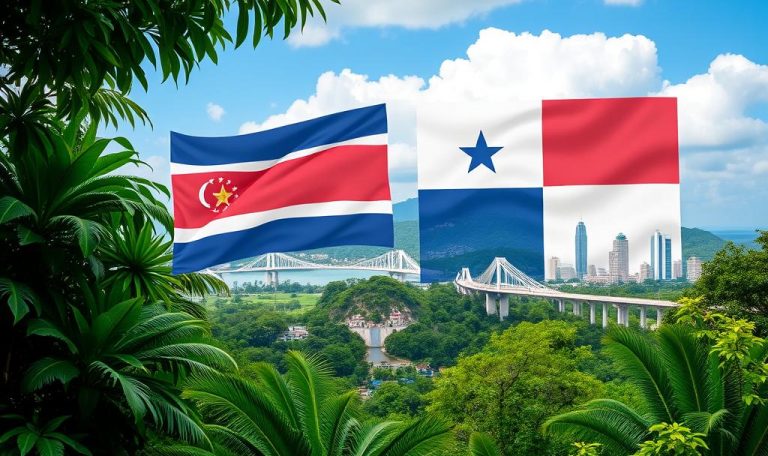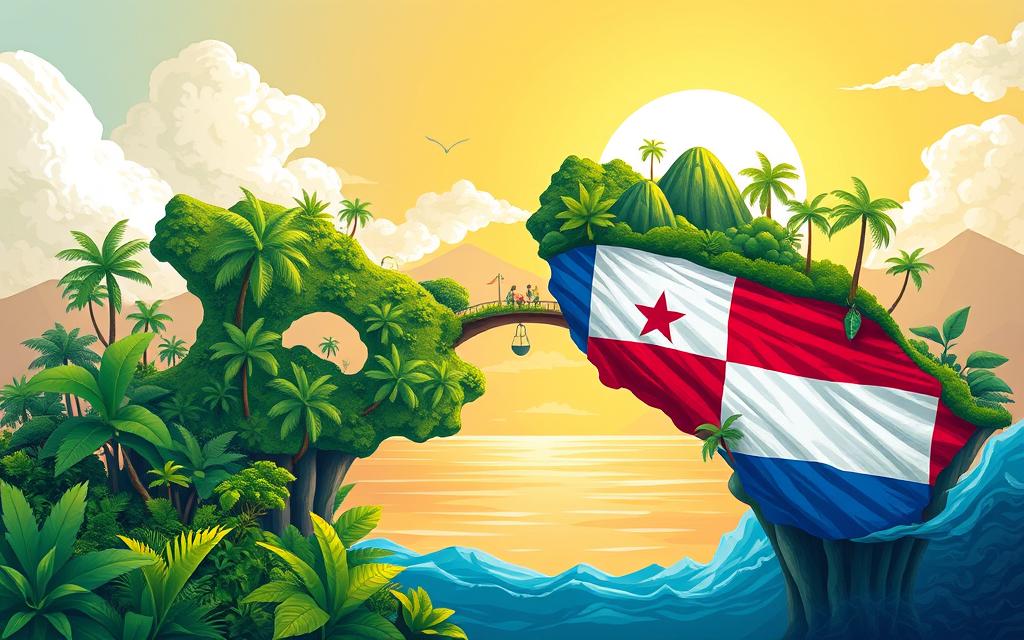The President of Costa Rica, Rodrigo Chaves, has promised to help Panama. He wants to clear Panama’s name as a tax haven. Costa Rica will soon lead the Organization for Economic Cooperation and Development (OECD). It’s eager to support Panama in removing its tax haven status.
Panama’s image took a hit from the “Panama Papers” scandal. It showed how secret offshore accounts were used for tax evasion and money laundering. But, Panama has made big changes. It has made tax evasion a crime, helping it leave the Financial Action Task Force (FATF) “grey list” in 2023.
Key Takeaways
- Costa Rica’s President Rodrigo Chaves has promised to assist Panama in clearing its tax haven blacklist status.
- The “Panama Papers” scandal severely damaged Panama’s reputation, revealing the use of secret offshore entities for tax evasion and money laundering.
- Panama has undertaken legal reforms, including the criminalization of tax evasion, which allowed it to exit the FATF “grey list” in 2023.
- Costa Rica’s upcoming OECD presidency has led it to express interest in supporting Panama’s efforts to remove itself from tax haven lists.
- International cooperation and financial transparency are key to addressing the issue of tax havens and offshore accounts.
Costa Rica’s Commitment to Support Panama
President Rodrigo Chaves of Costa Rica has promised to help Panama get off the blacklists of tax havens. Chaves said Costa Rica is ready to help as it leads the OECD. This shows Costa Rica’s dedication to helping Panama improve its financial rules and transparency.
President Rodrigo Chaves’ Promise
Panama’s President, José Raúl Mulino, thanked Costa Rica for its support. He plans to visit Europe to remove Panama from “any discriminatory mechanism.” This teamwork shows their shared aim to boost international cooperation and tackle Panama’s tax haven image.
Panama’s Efforts to Remove Itself from Tax Haven Lists
Panama has made legal changes, like making tax evasion a crime. This move helped Panama leave the FATF “grey list” in 2023. These steps show Panama’s effort to meet global financial standards and be more transparent.

“We have put ourselves at their disposal. The president of Panama, José Raúl Mulino, has expressed his gratitude, and he has told me that he will travel to Europe visiting whoever needs to be visited to get Panama off any discriminatory mechanism.”
– President Rodrigo Chaves of Costa Rica
| Country | Progress in Removing Tax Haven Status | Key Reforms |
|---|---|---|
| Costa Rica | Committed to supporting Panama’s efforts | Assumed OECD presidency to aid Panama |
| Panama | Exited FATF “grey list” in 2023 | Criminalized tax evasion, improved financial transparency |
Costa Rica to Aid Panama in Clearing Tax Haven Blacklist Status
Costa Rica is making a big move to help Panama. They want to remove Panama’s tax haven blacklist status. Costa Rica is now the president of the Organisation for Economic Co-operation and Development (OECD). They are ready to work with Panama to fix its tax haven image.
The two countries are teaming up to solve this problem. They know how important it is to be open and accountable in finance. Costa Rica wants to help Panama become a respected financial center, without the tax haven label.
| Initiatives | Objectives |
|---|---|
| Enhanced Information Sharing | Improve transparency and data exchange between the two countries |
| Joint Taskforce on Tax Compliance | Identify and address any tax evasion or avoidance practices |
| Capacity Building Programs | Strengthen Panama’s financial regulatory framework and enforcement capabilities |
Costa Rica and Panama are ready to make a big difference. They will work together to improve financial transparency and fight tax haven issues. This shows how important international cooperation is in solving global financial problems.
“This partnership is a testament to our shared commitment to creating a more equitable and transparent global financial system. Together, we will work tirelessly to clear Panama’s name and restore its reputation as a responsible financial hub.”

Implications of Panama’s Tax Haven Reputation
Panama’s status as a tax haven has sparked a lot of debate. The “Panama Papers” scandal in 2016 hurt its financial image. It showed how secret offshore accounts were used to dodge taxes and hide money.
This scandal led to the resignation of top officials in many countries. It also resulted in the conviction of those involved in these illegal activities.
The “Panama Papers” Scandal
The “Panama Papers” scandal revealed how Mossack Fonseca helped set up secret companies and accounts. These were used to hide who really owned assets and avoid taxes. The leak of over 11 million documents from the firm caused global outrage.
It led to many investigations and efforts to stop tax evasion and money laundering.
Legal Reforms Undertaken by Panama
After the “Panama Papers,” Panama’s government made big changes to fight tax evasion. They made tax evasion a crime, which was a big step. Panama also made its anti-money laundering laws stronger.
They also worked more with international groups like the Financial Action Task Force (FATF). This was to deal with its image as a tax haven.
| Legal Reform | Impact |
|---|---|
| Criminalization of Tax Evasion | Significantly strengthened Panama’s ability to combat tax avoidance and evasion. |
| Improved Anti-Money Laundering Regulations | Enhanced financial transparency and made it more difficult for illicit funds to be laundered through the country. |
| Increased International Cooperation | Allowed Panama to collaborate more effectively with global organizations and jurisdictions to tackle tax evasion and financial crimes. |
These changes, along with Panama’s efforts to leave the FATF’s “grey list” in 2023, show progress. But, the “Panama Papers” scandal’s impact still affects Panama. Its history as a tax haven is a big challenge to overcome.
International Cooperation and Financial Transparency
The problem of Panama’s tax haven status shows how important international cooperation and financial transparency are. Costa Rica, now leading the Organization for Economic Cooperation and Development (OECD), is working with Panama. They aim to tackle this big issue together.
The Role of the OECD
The OECD is a key group that helps countries work together on economic issues. It focuses on setting global tax standards and fighting tax evasion. The OECD’s help is crucial in getting Panama off tax haven lists.
The OECD does many things to help the global tax system. It:
- Creates international tax regulations and rules
- Checks how well tax policies are followed and finds tax havens
- Helps countries share tax information
- Offers help and training to its members
Costa Rica and Panama are showing they’re serious about solving the tax haven problem. They’re working with the OECD to make the global financial system more open.
“International cooperation and financial transparency are essential to ensure a fair and effective global tax system that benefits all countries and their citizens.”
Conclusion
Costa Rica is helping Panama get off the tax haven blacklist. This is a big step towards making financial dealings clearer and working together globally. Costa Rica, as the next leader of the OECD, wants to help Panama fix its image after the “Panama Papers” scandal.
This teamwork shows how important it is for countries to work together. They are fighting against tax evasion and money laundering. Costa Rica and Panama are showing the way by improving their financial rules and sharing information.
Getting Panama off the blacklist would be a big win for everyone. It would show that countries can work together to keep the financial system honest. The partnership between Costa Rica and Panama is a sign of hope for a fairer and more open financial world.



